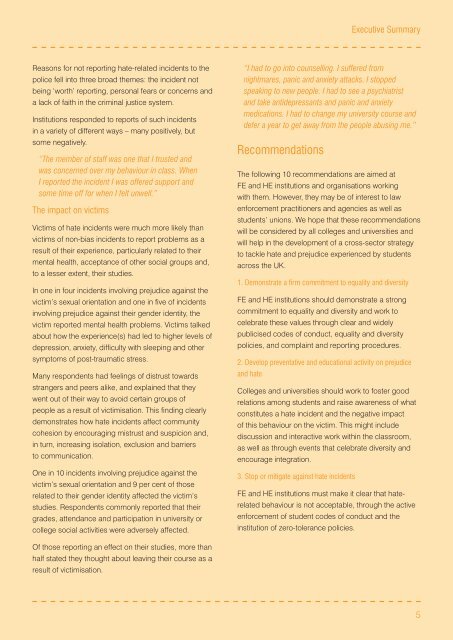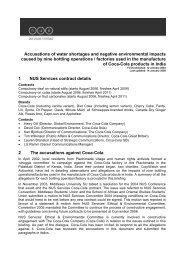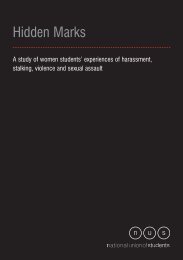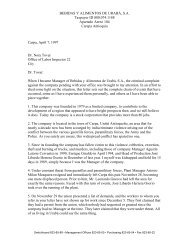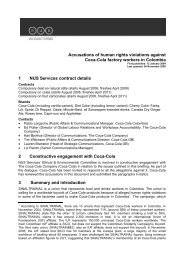No Place for Hate Crime - National Union of Students
No Place for Hate Crime - National Union of Students
No Place for Hate Crime - National Union of Students
You also want an ePaper? Increase the reach of your titles
YUMPU automatically turns print PDFs into web optimized ePapers that Google loves.
Executive Summary<br />
Reasons <strong>for</strong> not reporting hate-related incidents to the<br />
police fell into three broad themes: the incident not<br />
being ‘worth’ reporting, personal fears or concerns and<br />
a lack <strong>of</strong> faith in the criminal justice system.<br />
Institutions responded to reports <strong>of</strong> such incidents<br />
in a variety <strong>of</strong> different ways – many positively, but<br />
some negatively.<br />
“The member <strong>of</strong> staff was one that I trusted and<br />
was concerned over my behaviour in class. When<br />
I reported the incident I was <strong>of</strong>fered support and<br />
some time <strong>of</strong>f <strong>for</strong> when I felt unwell.”<br />
The impact on victims<br />
Victims <strong>of</strong> hate incidents were much more likely than<br />
victims <strong>of</strong> non-bias incidents to report problems as a<br />
result <strong>of</strong> their experience, particularly related to their<br />
mental health, acceptance <strong>of</strong> other social groups and,<br />
to a lesser extent, their studies.<br />
In one in four incidents involving prejudice against the<br />
victim’s sexual orientation and one in five <strong>of</strong> incidents<br />
involving prejudice against their gender identity, the<br />
victim reported mental health problems. Victims talked<br />
about how the experience(s) had led to higher levels <strong>of</strong><br />
depression, anxiety, difficulty with sleeping and other<br />
symptoms <strong>of</strong> post-traumatic stress.<br />
Many respondents had feelings <strong>of</strong> distrust towards<br />
strangers and peers alike, and explained that they<br />
went out <strong>of</strong> their way to avoid certain groups <strong>of</strong><br />
people as a result <strong>of</strong> victimisation. This finding clearly<br />
demonstrates how hate incidents affect community<br />
cohesion by encouraging mistrust and suspicion and,<br />
in turn, increasing isolation, exclusion and barriers<br />
to communication.<br />
One in 10 incidents involving prejudice against the<br />
victim’s sexual orientation and 9 per cent <strong>of</strong> those<br />
related to their gender identity affected the victim’s<br />
studies. Respondents commonly reported that their<br />
grades, attendance and participation in university or<br />
college social activities were adversely affected.<br />
“I had to go into counselling. I suffered from<br />
nightmares, panic and anxiety attacks. I stopped<br />
speaking to new people. I had to see a psychiatrist<br />
and take antidepressants and panic and anxiety<br />
medications. I had to change my university course and<br />
defer a year to get away from the people abusing me.”<br />
Recommendations<br />
The following 10 recommendations are aimed at<br />
FE and HE institutions and organisations working<br />
with them. However, they may be <strong>of</strong> interest to law<br />
en<strong>for</strong>cement practitioners and agencies as well as<br />
students’ unions. We hope that these recommendations<br />
will be considered by all colleges and universities and<br />
will help in the development <strong>of</strong> a cross-sector strategy<br />
to tackle hate and prejudice experienced by students<br />
across the UK.<br />
1. Demonstrate a firm commitment to equality and diversity<br />
FE and HE institutions should demonstrate a strong<br />
commitment to equality and diversity and work to<br />
celebrate these values through clear and widely<br />
publicised codes <strong>of</strong> conduct, equality and diversity<br />
policies, and complaint and reporting procedures.<br />
2. Develop preventative and educational activity on prejudice<br />
and hate<br />
Colleges and universities should work to foster good<br />
relations among students and raise awareness <strong>of</strong> what<br />
constitutes a hate incident and the negative impact<br />
<strong>of</strong> this behaviour on the victim. This might include<br />
discussion and interactive work within the classroom,<br />
as well as through events that celebrate diversity and<br />
encourage integration.<br />
3. Stop or mitigate against hate incidents<br />
FE and HE institutions must make it clear that haterelated<br />
behaviour is not acceptable, through the active<br />
en<strong>for</strong>cement <strong>of</strong> student codes <strong>of</strong> conduct and the<br />
institution <strong>of</strong> zero-tolerance policies.<br />
Of those reporting an effect on their studies, more than<br />
half stated they thought about leaving their course as a<br />
result <strong>of</strong> victimisation.<br />
5


